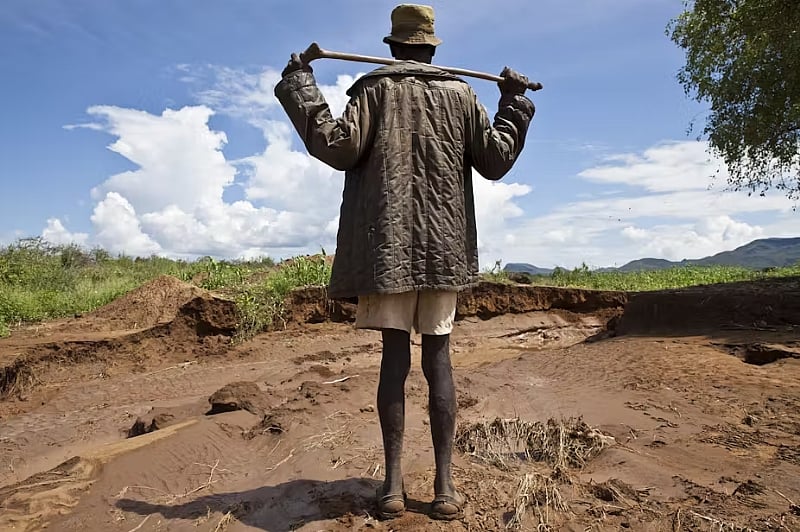Famine Early Warning Systems Network (Fews Net), a web-based platform for predicting famine, went offline on 30 January 2025. The system had provided up-to-date data to predict and track food insecurity in nearly 30 countries in Africa, central America and Asia for 40 years. It was funded by the US Agency for International Development (USAid). It went offline following USAid’s shutdown by the new US administration.
In Kenya, Fews Net worked with the National Drought Management Agency and the Kenya Food Security Steering Group to develop regular outlook reports at national and county levels. Timothy Njagi Njeru, an agricultural economist who researches food security and emergency responses, explains what Fews Net’s abrupt departure portends for Kenya.
What are the highlights of the network’s work in Kenya?
The famine early warning network provided data and interpretation to shape decisions on food insecurity in Kenya. The Kenyan pages on the web platform – which has gone dark – included:
an outlook for crop production based on climate data and extreme weather events
a standardised measure of food insecurity that helped governments prioritise their responses
a forecast of potential food crises using climate, economic and conflict data.
Fews Net was launched in response to devastating famines in east and west Africa in the mid-1980s. Its main objective was to gather and analyse data to help governments avert food security crises.
This evolved to support other critical areas that affected food security. For example, in the beginning, the network used weather information to generate forecasts on food crises. In time, it also collected price data and trade data, especially on staple commodities, to inform market stabilisation policies. And it tracked climate adaptation strategies.
Its work helped highlight the regions vulnerable to food insecurity, assessed the support these communities got and tracked the effects of weather variability.
In Kenya, the network worked with the Kenya Food Security Steering Group, which is made up of government, multilateral and non-profit agencies. The National Drought Management Authority, Kenya Meteorological Department and Kenya National Bureau of Statistics are in the group. So are the ministries of agriculture, health, water and education, and county governments. Development partners such as the Food and Agriculture Organization (FAO) and Unicef, and civil society organisations, such as the World Food Program and World Vision, are also members.
Their work was published in regular Food and Nutrition Security Assessments.
Fews Net also provided country and county-level briefs. These provided updates on the scale of food insecurity and assistance provided to these regions. They contained forecasts of crop and livestock production. They provided analyses of food trade, price trends, conflict incidences, and performance of assistance programmes. The forecasts helped generate recommendations for specific regions.
All this data was critical for market intelligence and developing value chains. It helped stakeholders make decisions about services, infrastructure support and demand or supply.
What difference has it made?
The Famine Early Warning Systems Network made a huge contribution to Kenya and the region as a whole. The seasonal food security forecasts enabled governments and development partners to respond to crises adequately and in a coordinated manner.
The network’s analytics on price trends and food trade proved very useful in overcoming obstacles to food trade. These included information asymmetry on demand and supply trends. The analytics also highlighted where infrastructural or security challenges might affect the flow of food from surplus to deficit areas. This equipped the government and stakeholders with the information to respond appropriately.
The analytics on household data provided information on household income, food availability and mechanisms to cope with food shocks. This informs government and others about local communities’ capacity to respond to shocks.
The tracking of local market price data informed policy responses, such as livestock offtake programmes at the height of drought or famines. Offtake programmes provide a ready market for families grappling with drought. They enable them to sell their cattle before incurring losses caused by livestock deaths during drought seasons. These programmes help communities enhance their market participation and reduce losses as they are able to sell their livestock at fair prices.
What gaps will its absence create?
The absence of the early warning network will affect Kenya’s ability to address food insecurity. It leaves a gap in financial and technical capacity to generate timely forecasts to inform decision making.
It will take time for other institutions to replace that contribution. In the short run, stakeholders can use the information that’s already been generated. In the medium term, there may be uncertainty and incoherence in interventions and investments.
Because Kenya’s weather has been so variable, the country needs seasonal forecasts at both national and county levels.
What should Kenya do to fill the gap?
Kenya can strengthen the capacity in institutions such as the drought management authority and statistics bureau.
In the long term, the country must increase financial investments that support food security. And it must build technical capacity to produce credible, reliable and timely food security forecasts.
Timothy Njagi Njeru does not work for, consult, own shares in or receive funding from any company or organisation that would benefit from this article, and has disclosed no relevant affiliations beyond their academic appointment.
By Timothy Njagi Njeru, Research Fellow, Tegemeo Institute, Egerton University


